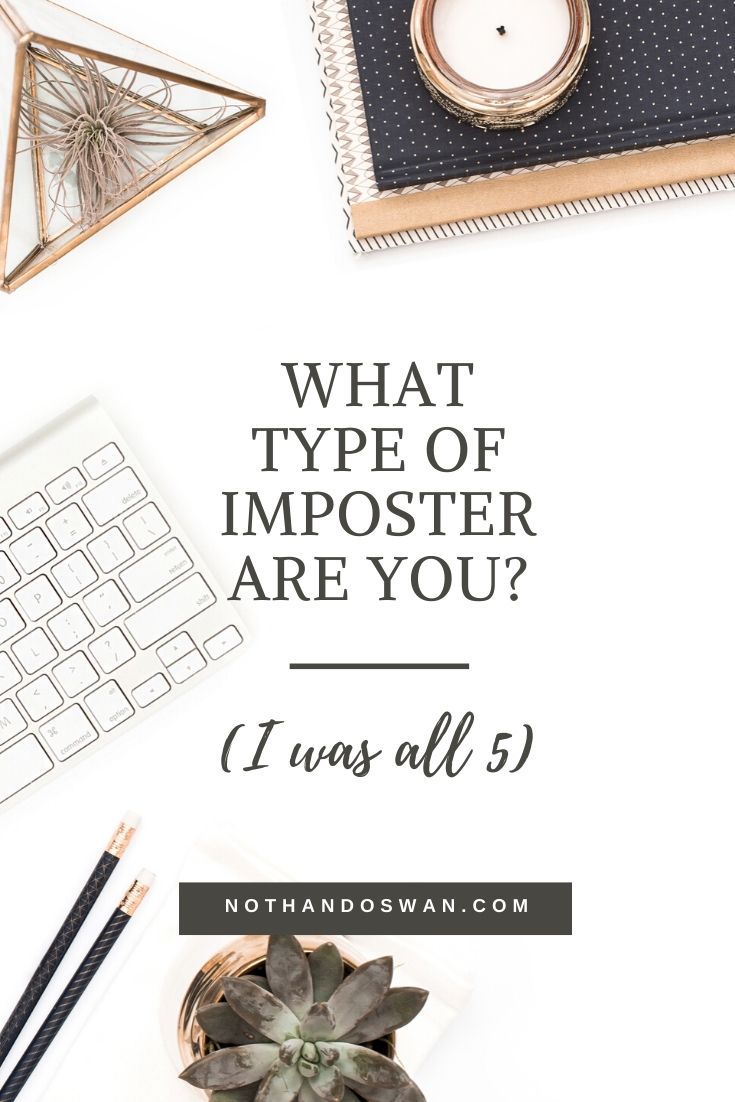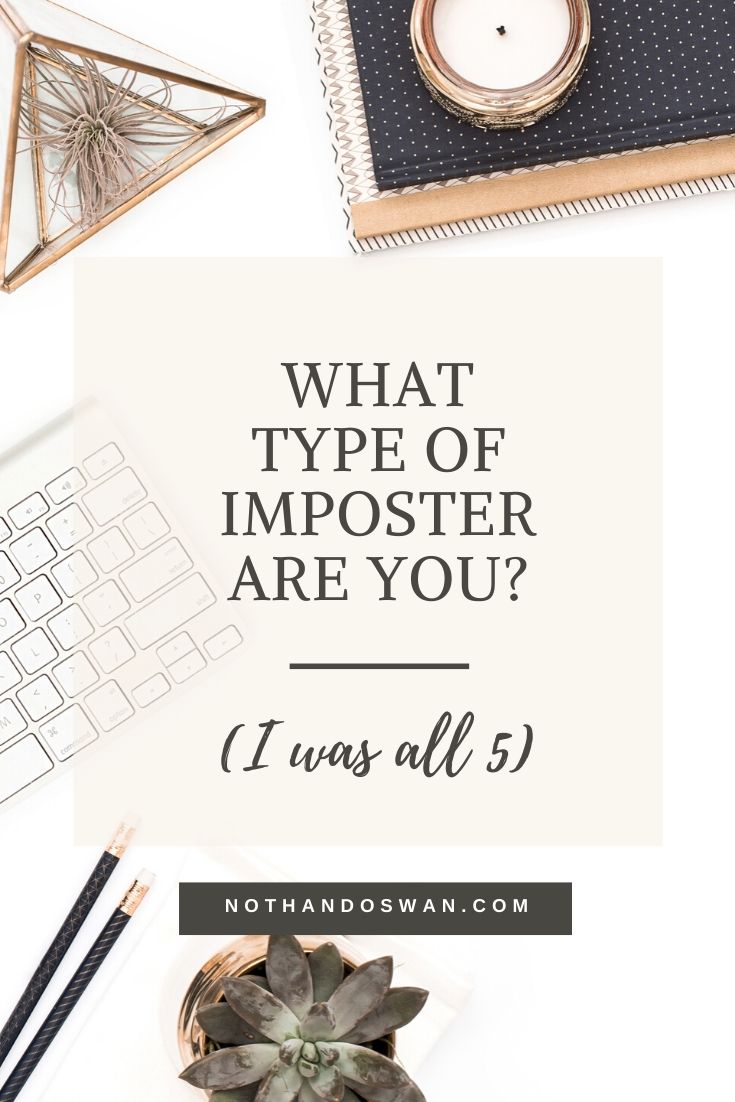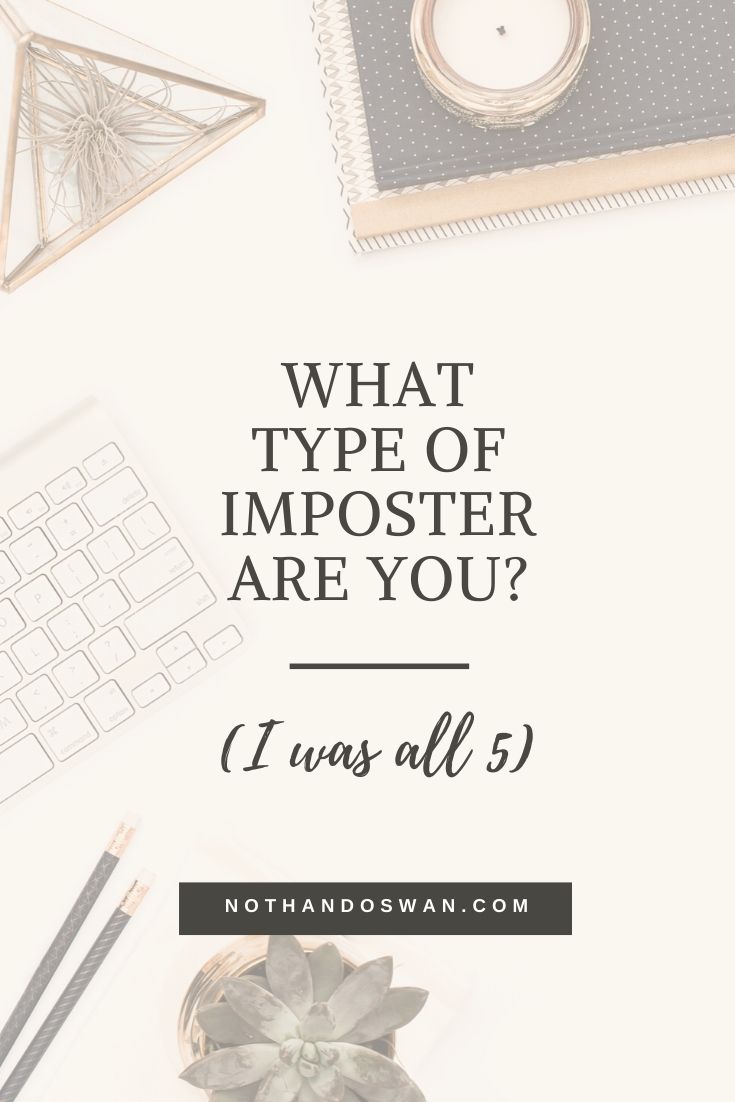I know you’re working on something, and I know it’s big. But so is imposter syndrome. It’s that annoying fear that we’re not cut out to do our work – even though we most definitely are.
So why do we struggle with it? Dr. Valerie Young gives us five reasons why, and they’re all centred around how we define competence.
I’m going to walk you through these 5 imposter types because I’ve experienced every single one. If you’ve fallen victim to any of them, you’ll recognize it right away.
Most importantly, the point of this activity is not to feel worse about yourself, but to recognize this so you can work through your imposter syndrome. You can do that with this free imposter syndrome workbook – 4 steps to overcome imposter syndrome.
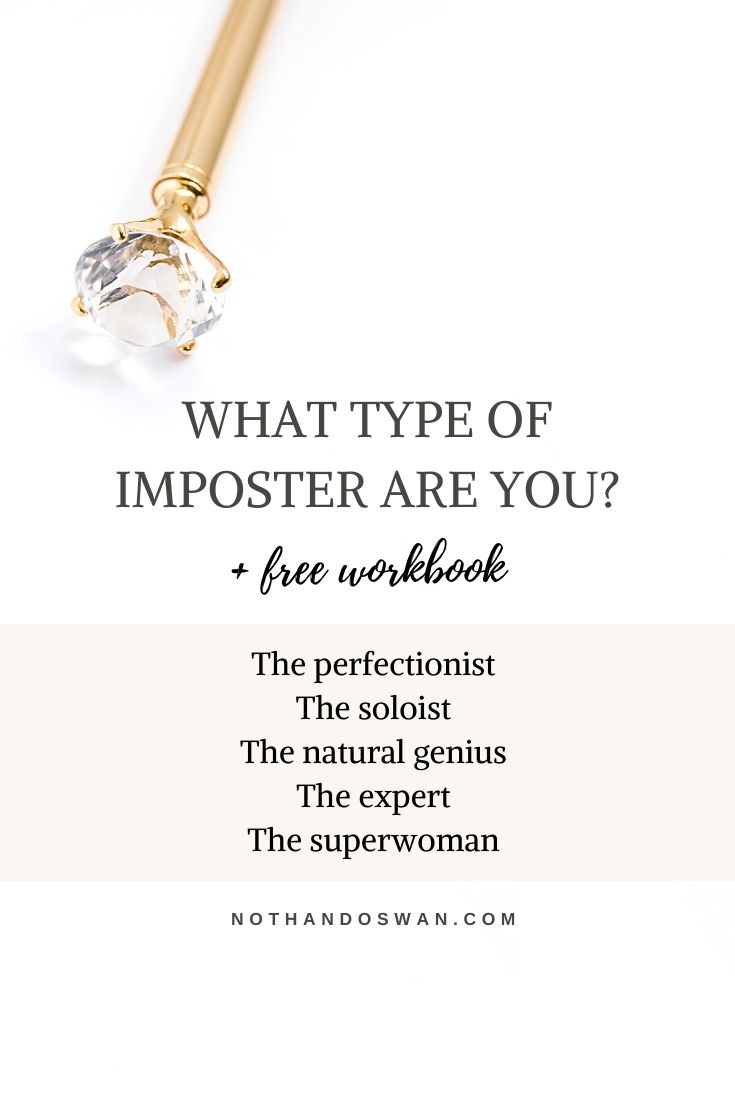
Imposter type 1: the perfectionist
If it’s not perfect, it’s not valid.
We all know that perfectionists set unrealistically high expectations for themselves. But not only does this set the stage for failure, it also sets the stage for imposter syndrome.
When I was writing my book, I had to get over my perfectionism in order to get anything on the page. I couldn’t start typing until I gave myself permission to suck. Essentially, once I heard that everyone’s first draft is awful, I allowed myself to just get started.
The expectation was no longer that I was going to write a masterpiece. I was just going to type a lot and then gather what I could from the scraps of my first draft…
…But then I felt like even more of a fraud. What kind of writer makes MISTAKES?!
Is this you?
If you’re striving towards perfection, you’ll always think that your work falls short. It’s good, but it could be better, and this makes you feel like you’re not really as qualified as people think you are.
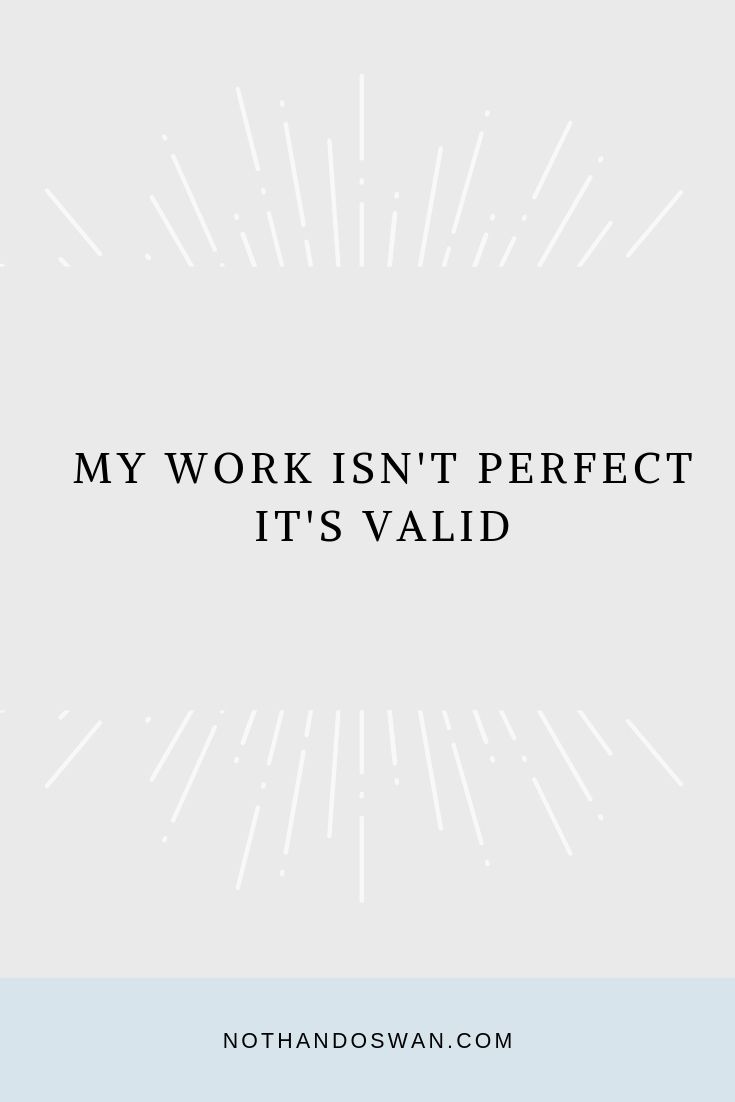
Perfectionists are prone to imposter syndrome because they think, if it’s not perfect, it’s not valid.
We find it hard to let other people manage tasks because they might not do them right. And when other people congratulate us, we criticize us.
My co-residents were amazed that I’d written a book while we were studying. But I kept downplaying it because I knew it wasn’t perfect and it wasn’t a big deal.
I’m laughing at myself as I type that out right now. Oh, this lil’ manuscript? It’s only fifty thousand words.
If you’re a perfectionist and struggling with imposter syndrome:
- Acknowledge that completing something is an accomplishment
- Start your work with the goal to finish it rather than to perfect it – you can’t perfect something that doesn’t exist, and
- Rest assured that your idea of “less than perfect” has gotten you places, and that’s not a mistake
Imposter type 2: the soloist
If I can’t do it all on my own, I’m not a real _____.
So I’d written the book, but then I had to ask for help… with everything.
I needed help formatting, editing, re-reading, organizing and designing the book. And in the future, I’m going to need help marketing, sharing, distributing and printing the book. I mean, let’s be honest, writing the manuscript was the first step of many.
It’s hilarious to think that there was a point in time when I thought I could be a writer, editor and marketer all on my own. On top of putting pressure on myself to write the book, I thought I was going to do everything under the sun to publish it myself.
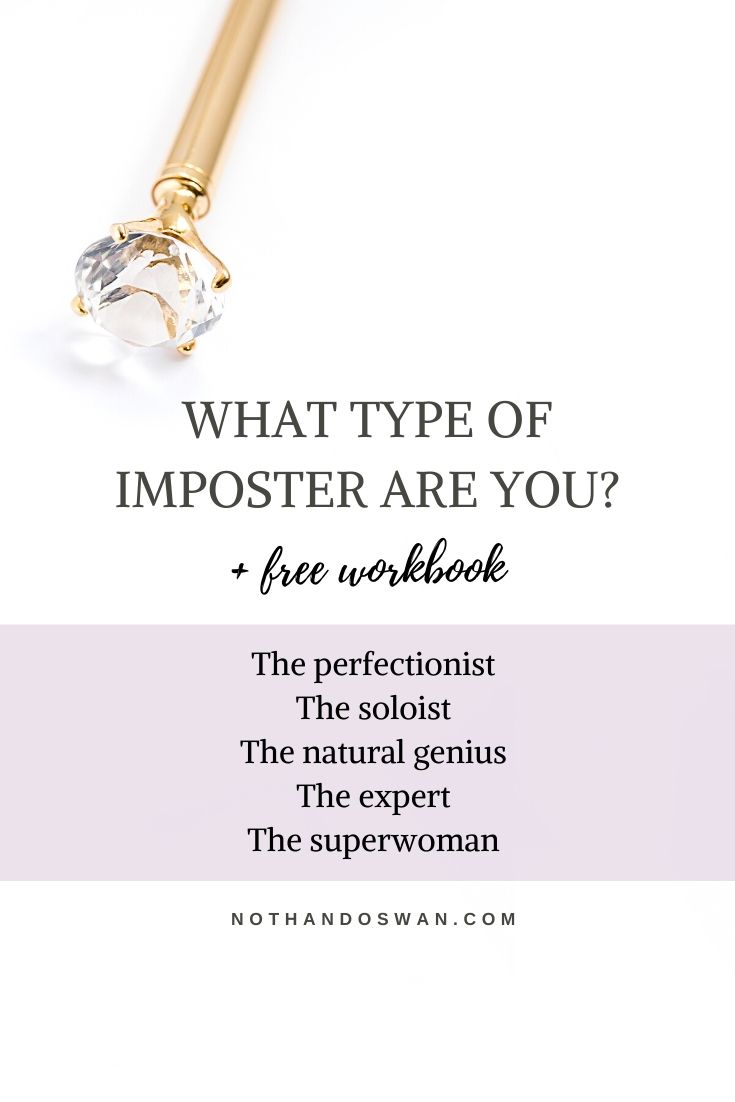
And when I couldn’t get the formatting just right? You guessed it: imposter syndrome. Lots of people format their own books; it’s not that hard to figure out Microsoft Word! Any real author can write their book and also make it into the perfect paperback, ready to hit the shelves.
No?
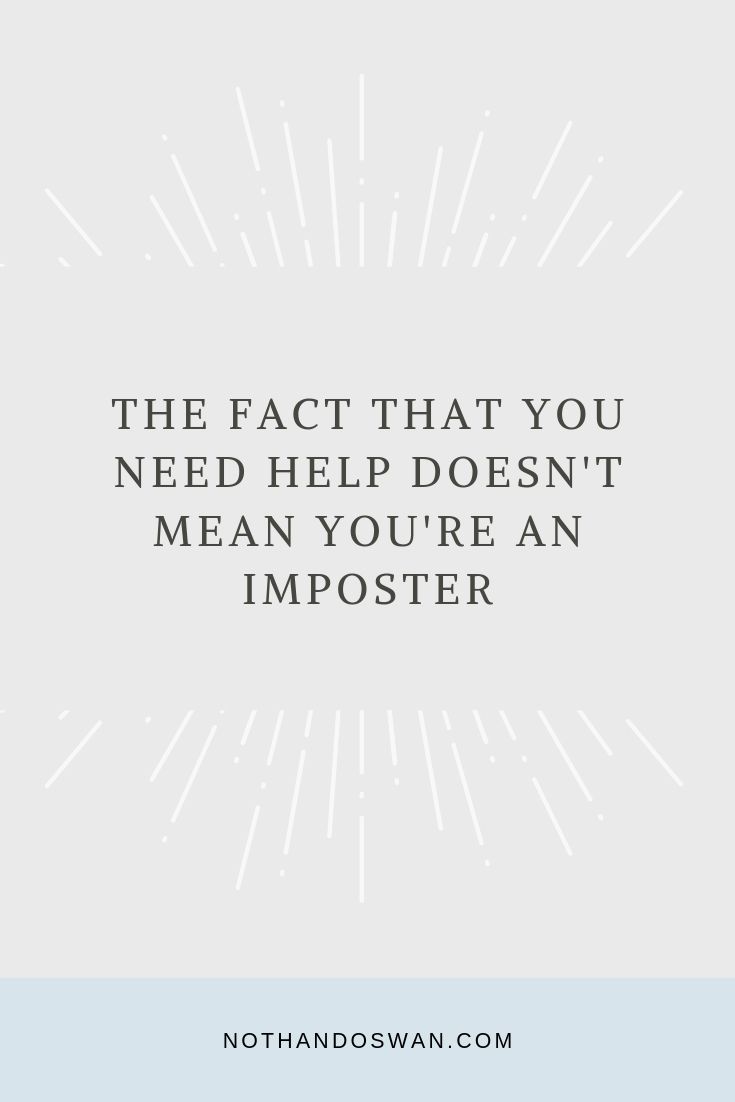
Is this you?
Soloists fall into the trap of imposter syndrome by thinking, if I can’t do it all on my own, I’m not a real ______.
But just because you need help doesn’t mean you’re an imposter. In fact, getting the help you need will only lead to a more polished end product.
Y’all. People who produce the most impressive work have teams. They rarely work in isolation, especially not if they have more than one project on the go.
So if you’re struggling with imposter syndrome because of soloist thinking:
- Give yourself some slack by accepting help
- Maximize your productivity by handing off what you’re not so great at, and
- Recognize that the people you look up to? They have teams.
Imposter type 3: the natural genius
I’m not getting this, so I’m clearly not made for it.
Now this line of thinking right here has got to be the most absurd, but you bet I’ve thought this way too. The natural genius feels like an imposter because the thing she’s working on doesn’t “come naturally” to her.
Now, why would anyone feel like an imposter because it took him time to learn a new skill? Why would anyone possibly think she was a fraud just because it took a while to learn a new language? Oh, let me tell you.
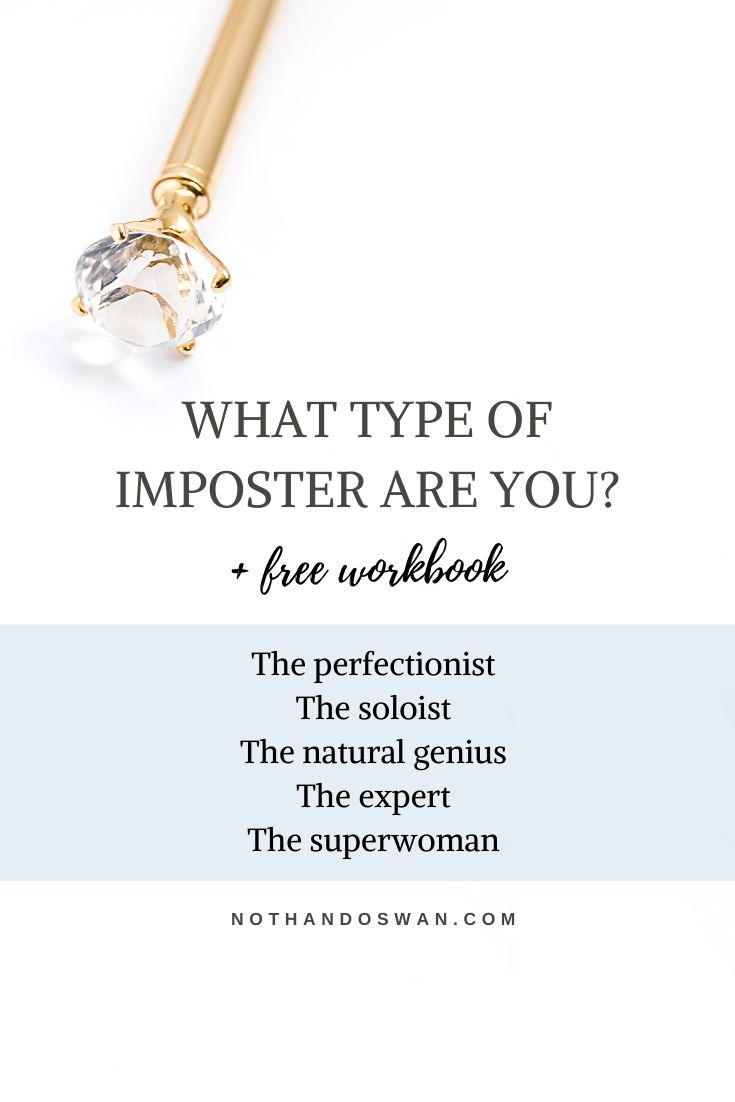
I’m learning my fourth: Portuguese. Logically, since I’ve learned two other languages later in life, this should be a walk in the park, right? And clearly, because I already speak Spanish, Portuguese should be easy! If I were a real language connoisseur, I should be able to just “pick it up.”
Now, it goes without saying that Portuguese is its own language. It is not the same as Spanish. But for some reason, the fact that I wasn’t able to just download the rules of Portuguese into my head and then start speaking it made me feel like I wasn’t good at learning languages.
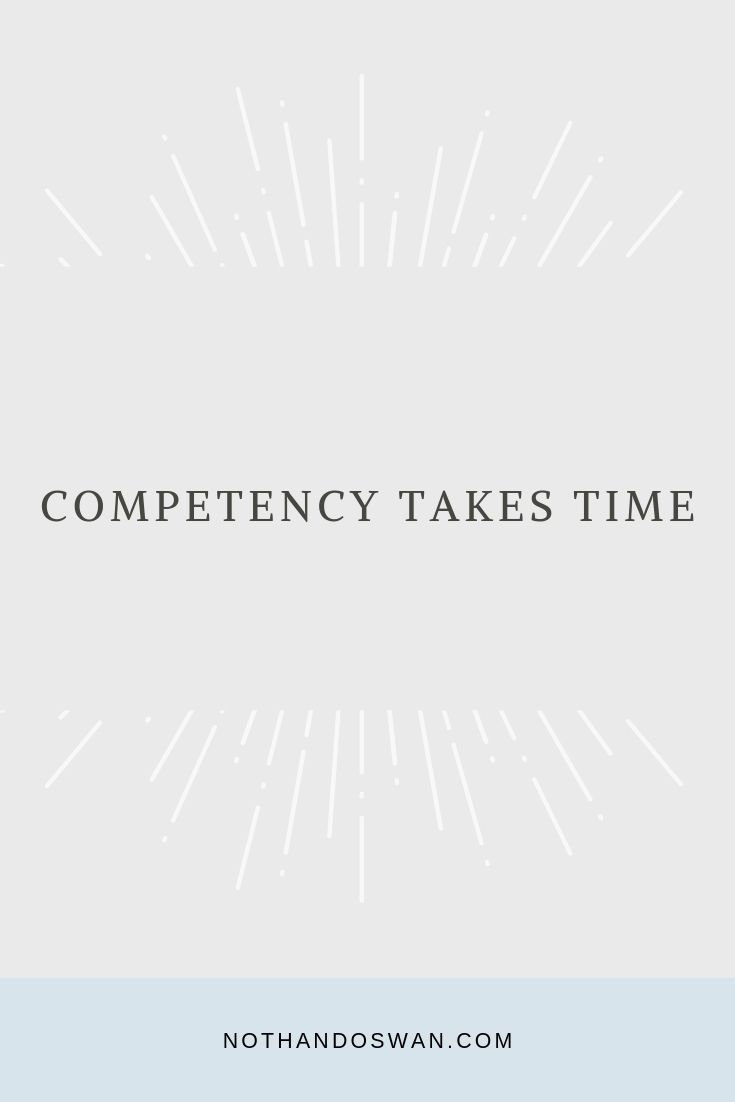
Is this you?
The irony is that, since I learned French and Spanish as foreign languages, I should’ve known that this overnight success just doesn’t exist. I learned each of those languages over years, and so it was unfair to call myself an imposter just because Portuguese wasn’t coming “naturally” to me.
Natural geniuses think, I’m not getting this, so I’m clearly not made for it. They feel like fakes because it takes time for them to gain competency.
But that’s the thing. It takes time to gain competency!
If you’re struggling with imposter syndrome because your work is taking a while, try:
- Looking at the syllabus for a course that teaches people how to do what you’re doing. The fact that it’s a long and complicated curriculum should give you some perspective.
- Remove the phrase, “I’m just not good at” from your vocabulary. You’re learning, and
- Allow yourself to practice what you’re working on
Imposter type 4: the expert
It’s only a matter of time before someone asks me something I don’t know, which’ll prove that I’m a fraud.
Because I speak well-used languages, I’ve been to a lot of cities on my own. The last time I solo travelled, I went to Ubud, Bali, which was more than a day’s flight away from home. It was also more than just a little different from home.
I had the most amazing time walking around the city, trying new foods, and navigating new spaces. And surprisingly, there were only a few times when I wondered whether or not I’d be able to figure things out on my own.
When it got really late and I’d been walking all day, I wondered if I could figure out how to catch a ride on the back of a motorbike. Could I figure out how to get to the Jatiluwih Rice terraces and back to my Airbnb alone? Yes and yes.
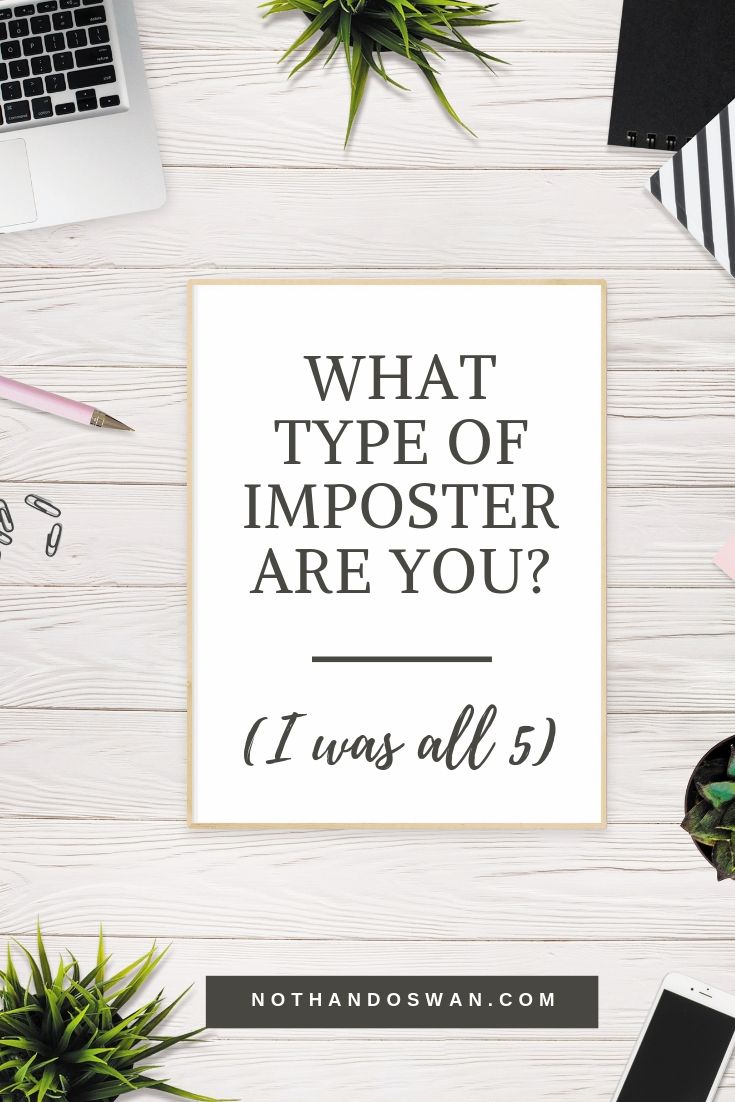
Yet, despite traveling to Ubud and to some of the biggest cities in the world, I still wondered if I could call myself a solo traveller. I mean, I didn’t have any travel awards or a travel blog, and I didn’t know how to find the best deals on flights and accommodations. Since I didn’t know everything, I was really just pretending to be a solo traveler.
Being an expert means opening yourself up to the possibility of being asked a question that you don’t know the answer to. We ask experts all the toughest questions, questions that have stumped other people. If they don’t know the answer, they’re probably working on it.
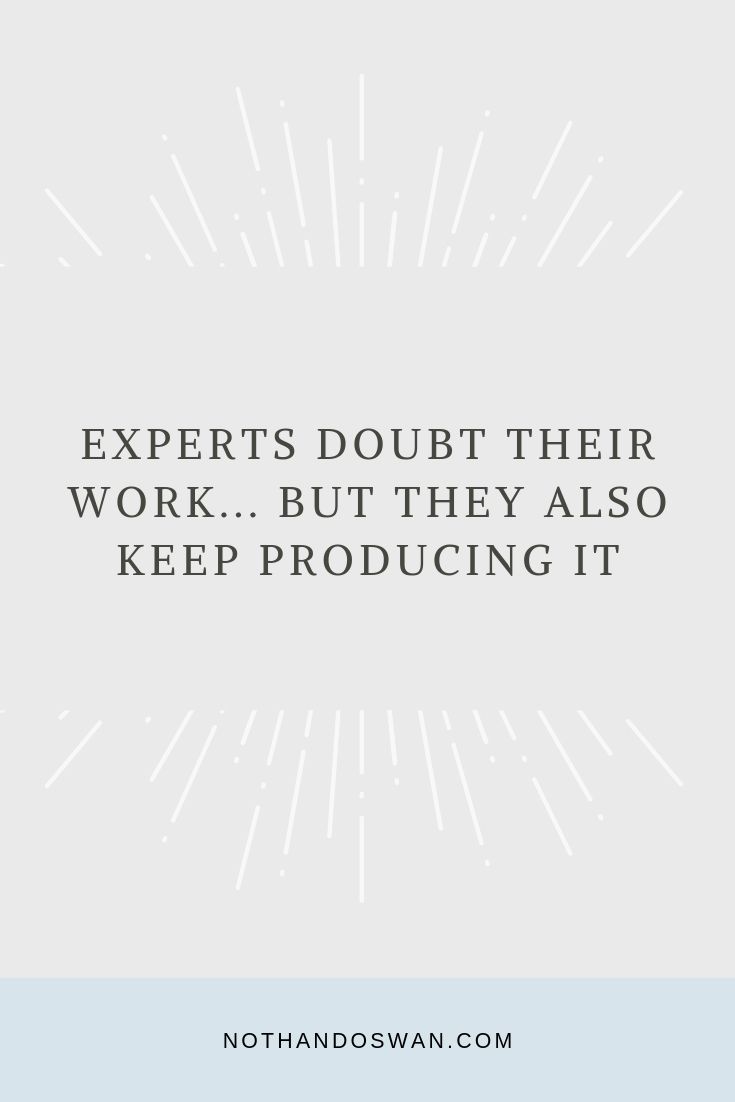
Is this you?
Experts worry that they don’t know it all. They think, it’s only a matter of time before someone asks me something I don’t know, which’ll prove that I’m a fraud. They count knowledge gaps as proof that they’re really a sham.
But you’re not a sham. If you’re feeling like an imposter because you may not have all the answers, consider that:
- People are not here to call you out. They’re here for your expert opinion.
- Comparing yourself to other experts just makes things worse, and
- Experts in every field struggle with not feeling like they know enough – but they keep doing their work, and we appreciate them for it
Imposter type 5: the superwoman
If I were legit, I’d be crushing everything… all the time.
Speaking of experts, my medical training has been one of my biggest gifts. But in my first year of residency, I just could not understand why I was so tired.
I really thought that I should be able to go to clinic, do academic day, go to global health sessions, write my book, study for my licensing exam, do my research project, love on my partner, visit my family, exercise, cook and look amazing with no problems.
I fell short on all of these things at times. Especially the look amazing part. My “no make up make up routine” actually involves no make up (which I think is genius). And not doing the best in all of my roles, always, made me feel like I wasn’t a good doctor. Or a real friend. Or writer. Etc, etc.
I’m so proud of all the things I’ve been able to accomplish, but make no mistake, I haven’t always been the best student or the epitome of health. (I’m still working on my workout routine, and you can read about that here.)
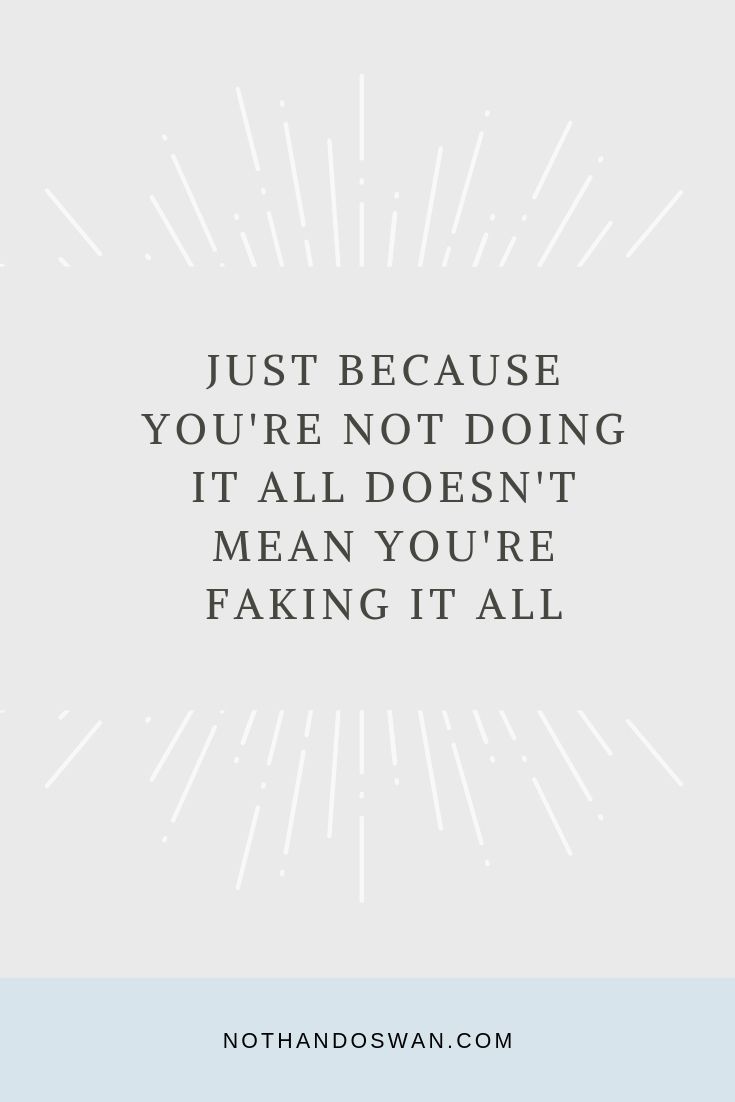
Is this you?
If you’re also working on a lot of things, know that you’re not an imposter just because you’re tired. You’re not a fraud because you’ve “dropped the ball” on something or because everyone else is doing it all and they’re wearing contour.
Oftentimes, we judge our competence based off of how many roles we can fill and how effortlessly we can fill them. Superwomen fall into the trap of thinking that because they can’t show up at 1000% for every single thing, they must be faking it. They think, If I were legit, I’d be crushing everything… all the time.
If you’re a superwoman thinker, then remember that:
- You don’t have to prove anything to anyone
- It’s okay to put down one of your roles, and
- Just because you’re not doing it all doesn’t mean you’re faking it all
***
So these are just some of the ways that imposter syndrome has shown up in my life. In each circumstance, I had to acknowledge how I was feeling but move past it anyways. It’s a simple, but intentional process.
When imposter syndrome shows up, I want you to be able to recognize it and move past it because your work is impactful, and it’s needed.
If you’re ready to work through your imposter syndrome, download and complete my free workbook. It’s how I was able to write that book and learn a new language even though I doubted myself. It’s also the difference between living up to your full potential or continuing to play small.
Summary
Women like us, who’ve done amazing work and accomplished big, bold dreams don’t always feel like we’re anything special. In fact, we often feel like we just got lucky or that someone’s made a mistake in acknowledging us. I love how Dr. Young outlines five types of thinking that contribute to this:
- The perfectionist
- The soloist
- The natural genius
- The expert
- The superwoman
When we’re working towards our big and bold passions, we have to make sure that our definition of competence isn’t unachievable. We have to combat self-doubt by recognizing the thought patterns that trap us into feeling like imposters.
We can move past imposter syndrome by calling out these thoughts and doing the work to move through them. Competence does not mean perfection. It doesn’t mean that we know it all and don’t ever have to ask for help. Dr. Young says that if we’re conscious of this, “instead of having an imposter life, [we] can have an imposter moment.”
If you’d like to read more about this topic, or if you need a bit more help in getting past your imposter syndrome, here’s a post that’ll walk you through it, step-by-step. You’ve got this.
